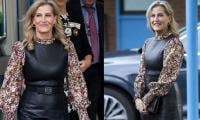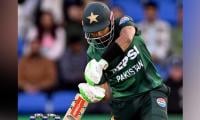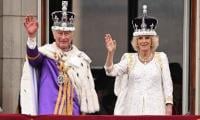ISLAMABAD: Blaming the Election Commission of Pakistan and international establishment for his party’s defeat in the general elections, JUI-F chief Fazlur Rehman Wednesday rejected the election results and decided to sit on the opposition benches in the National and provincial assemblies.
“The Central Working Committee of JUI-F, which met for two days in Islamabad, has rejected the overall results of general elections. The results have shattered the record of engineering of 2018 polls,” he said while addressing a press conference here after chairing a meeting.
Fazl said the JUI-F would play its parliamentary role in the assemblies and attend the proceedings with reservations but would not become a part of the unified government.
“We also invited PMLN to sit on the opposition benches with us,” he said.
He said the JUI-F CWC had rejected the statement of the Election Commission of Pakistan (ECP) in which it declared the polls as fair and transparent.
Fazl said the party’s leadership also noted that the ECP remained hostage to the establishment.
“We feel parliament has lost its importance and democracy is losing its case,” he said, adding that it seems the decision will now have to be taken outside parliament.
He said the decision to sit on the opposition benches was final and there was no room for any review. “We take our independent decision and are not bound to follow the decisions of PPP or PMLN,” he said.
Asked whether his MNAs would vote Sharif in the election for prime minister, he categorically said they would not become a part of the coalition government. “We are not their allies,” he said.
He said the JUI-F leadership had also observed that if the establishment felt that the elections were fair and transparent, then its narrative of May 9 stood buried and people had given mandate to traitors.
He said the ECP’s role had been doubtful from the very first day and till today it was refusing to hear the appeals of JUI-F candidates and their applications were being rejected without issuing notices to them.
“I am not talking about any particular seat but have taken the stance with regard to overall results of elections,” he said.
The JUI-F leadership also alleged the use of money in changing results at various places.
“The results being announced by the Election Commission hint that not only money was used to declare candidates successful but the whole provincial assembly was also given away in this way,” Fazl said, adding that he was speaking on behalf of the party’s CWC and not in his personal capacity.
The JUI-F leader also blamed the international establishment for the defeat, saying his party felt that it was punished in the elections for its stand on Palestine and extending support to Hamas and its leaders visiting Afghanistan to meet the leadership of Islamic Emirate. Fazl said the CWC meeting had also recommended that the JUI-F should decide on quitting the parliamentary politics and waging a struggle for creating an atmosphere where general elections could be held without the establishment’s interference.
“We will appreciate the establishment if it stops interfering in politics; otherwise, we will respond to them in political language,” he said.
Fazl agreed to a questioner that Afghan nationals were also helped to win elections in some constituencies. He said a candidate of PMLN, who withdrew in favour of Mahmood Khan Achakzai, was declared successful.
He maintained the JUI-F was an ideological force and without making any compromise it would announce a countrywide movement after consultation with the party’s general councils in separate meetings in Islamabad and four provincial capitals from February 22 to March 5.
"I share grief of families of those who died in accidents," says Punjab CM
"When pressure in the system reaches 5bcf, it can burst anytime, depriving whole country of gas availability," say...
Local authorities have announced plans to sprinkle water with dust suppressants on roads to reduce dust
Israeli strikes on Baalbek hit close to ancient Roman ruins designated as Unesco World Heritage sites
Trophy’s journey marked by grandeur, having previously graced iconic locations like Taxila Museum and Khanpur Dam
Shifting weather patterns caused by climate change provide optimal conditions for Aedes aegypti mosquito, says Kabirul...







